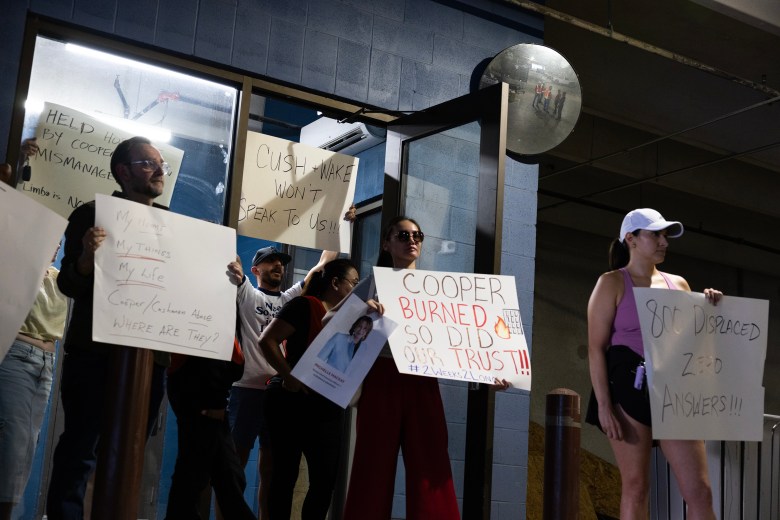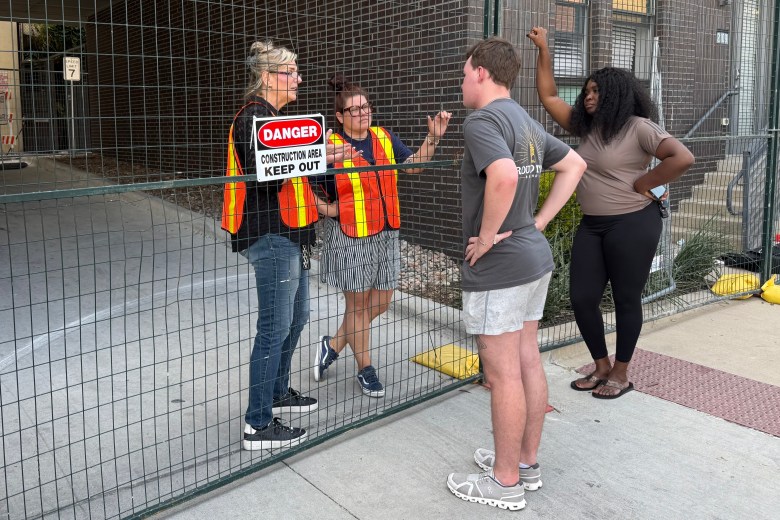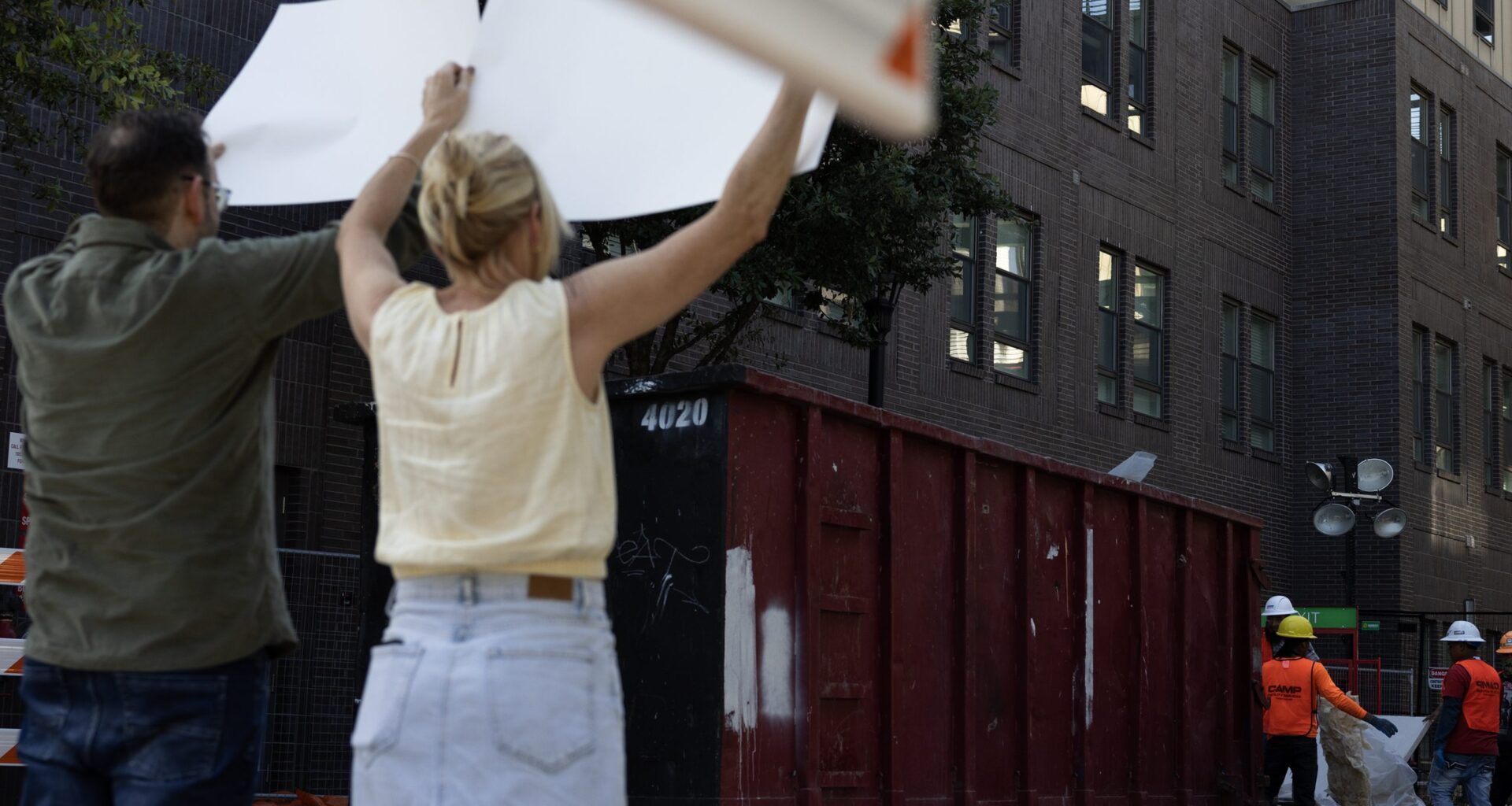Almost six weeks after a six-alarm fire at The Cooper apartment complex in Fort Worth displaced more than 800 tenants, details are emerging about whether they can reconnect with belongings left in the building.
For some residents, the answer isn’t what they expected — or wanted to hear.
Gage McGraw, a 22-year-old doctoral student at Texas Christian University, said he received notice from The Cooper’s property management company on the night of July 31 that he will not be allowed to retrieve his belongings from the apartment unit he occupied for about a month before the fire.
“We will remove and dispose of the remains of your personal property because it causes a health and safety hazard,” the letter read, according to a copy reviewed by the Fort Worth Report. “We are very sorry for your loss.”
The letter explained that The Cooper could not allow McGraw access to retrieve his belongings because of several factors, including because the building is not structurally safe, because his apartment and personal property were “completely destroyed” and because of mold. It said the apartment and McGraw’s belongings are contaminated by toxic mold that would require a specialist to contain, remove or remediate.
“Such activities are unfortunately not feasible in your apartment due to the extensive fire damage to the building,” according to the letter.
A spokesperson for RPM Living, The Cooper’s property management company, did not return a request for comment.
McGraw said he was “completely caught off guard” by the letter, as his unit, No. 1322, was one of about 100 earlier deemed safe to enter temporarily to retrieve belongings, according to a June 27 structural report by DGA Consulting Engineers.
The report labeled about two dozen units as having “major structural damage and should not be accessed” and more than 100 as “can be accessed and remain occupied.” More than 20 units had locked doors and could not be accessed by engineers, according to the report.
McGraw said Fort Worth firefighters helped him retrieve essential items, such as clothing and toiletries, in late June.
Since then, McGraw said, he hadn’t received any communication from The Cooper’s management company about his personal belongings until July 31. The Cooper was managed by Cushman & Wakefield before and shortly after the fire but has since been taken over by RPM Living.
 Former residents of The Cooper and other supporters protest in the property’s parking garage July 7, 2025, in Fort Worth. Residents said they were demanding answers from The Cooper’s then-property management company, Cushman & Wakefield, after two weeks of what they described as “radio silence.” (Maria Crane | Fort Worth Report/CatchLight Local/Report for America)
Former residents of The Cooper and other supporters protest in the property’s parking garage July 7, 2025, in Fort Worth. Residents said they were demanding answers from The Cooper’s then-property management company, Cushman & Wakefield, after two weeks of what they described as “radio silence.” (Maria Crane | Fort Worth Report/CatchLight Local/Report for America)
Throughout July, displaced tenants protested at The Cooper and its sister properties in Fort Worth, demanding answers about the state of the apartments’ two buildings, their personal belongings and what they called misleading information about insurance coverage.
“This whole situation is just very, it’s inhumane. It’s morally wrong to have us sit out here for a month and a half and have to try and fight for our own belongings,” McGraw said. “That speaks volumes about the character of the people who are in charge of this place.”
McGraw said he woke up at 6 a.m. Aug. 1 and drove from Houston, where he is staying with family, to demand answers in person.
By noon, he and a handful of other residents stood outside The Cooper while a line of tenants in cars trailed down the street. Workers allowed some tenants to drive inside the property’s parking garage but declined to comment to the Report.
 Former tenants of The Cooper, Gage McGraw, center, and Harriet Asare, right, speak with workers at the apartment complex Aug. 1, 2025. (Cecilia Lenzen | Fort Worth Report)
Former tenants of The Cooper, Gage McGraw, center, and Harriet Asare, right, speak with workers at the apartment complex Aug. 1, 2025. (Cecilia Lenzen | Fort Worth Report)
Standing outside, Harriet Asare, 35, said she lived at The Cooper for about 17 months in unit 1335, one of the apartments structural engineers said were safe to access and occupy.
She also received an email from RPM Living the night of July 31. However, her letter noted that property management is still determining whether it is safe to reenter the building and whether any of her belongings are retrievable.
It said “the building and your personal property are almost certainly contaminated by hazardous substances which are not safe for humans or animals (including, without limitation, cancer-causing compounds, smoke, debris and mold caused by fire fighting water damage),” according to a copy of the letter reviewed by the Report.
Asare said she remains hopeful that she’ll be able to get her belongings, as she’s used up all her emergency funds finding new housing and replacing essential items. If The Cooper doesn’t allow her into the unit, she wants the company to take accountability for the fire and provide help.
“They have put us in this inconvenience,” Asare said. “So what are they gonna do to compensate us for all this trouble? It looks like they’re not ready to do anything.”
The Cooper released tenants from leases and refunded prorated rent and security deposits, company officials have said.
Asare, who was staying with a friend during the aftermath of the fire, said she signed a lease at a new apartment complex July 31. She’s moving her life forward, but sentimental belongings, such as souvenirs from a recent trip to her home country of Ghana, remain left behind at The Cooper, she said.
McGraw said he wants the personal items that are important to this chapter of his life: handwritten notes to and from his girlfriend, his extensive vinyl record collection and a developing fashion wardrobe.
For McGraw, hope is sparse after not getting answers on Friday. He was planning to drive back to Houston that night, unsure what to do next.
Cecilia Lenzen is a government accountability reporter for the Fort Worth Report. Contact her at cecilia.lenzen@fortworthreport.org.
At the Fort Worth Report, news decisions are made independently of our board members and financial supporters. Read more about our editorial independence policy here.
Related
Fort Worth Report is certified by the Journalism Trust Initiative for adhering to standards for ethical journalism.
Republish This Story
Republishing is free for noncommercial entities. Commercial entities are prohibited without a licensing agreement. Contact us for details.
